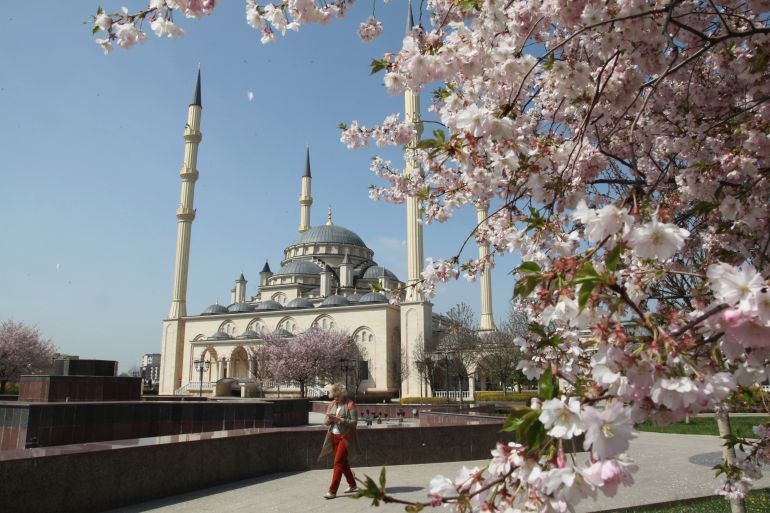Russia is set to launch Islamic banking: All you need to know
Russia is launching Islamic banking for the first time as part of a two-year pilot programme on September 1.

Russia is launching Islamic banking for the first time as part of a two-year pilot programme on September 1.
With a sizeable Muslim population estimated to be up to 25 million, Islamic financial institutions have existed in Russia until now, but this is the first time the country’s legislation has officially endorsed its launch.
Keep reading
list of 2 itemsTurkey makes bigger than expected interest rate hike, targets inflation
On August 4, Russian President Vladimir Putin signed a law introducing Islamic banking to assess its “feasibility”.
The pilot programme will take place in four Muslim-majority republics – Tatarstan, Bashkortostan, Chechnya and Dagestan, areas that already have the most experience in Islamic finance.
If the programme proves to be successful, the plan is to introduce the new regulation to the rest of the country.
Here’s all you need to know about the new experiment:
What is different about Islamic banking?
Islamic banking operates under Shariah, the Islamic legal system that forbids transactions involving usury, or charging of interest as it is considered an unjust exchange.
Whereas conventional finance is debt-based and the client bears all the risk and liability in transactions, Islamic banking is asset-based, with profit and risks shared between the financial institution and the client as part of a partnership.
“No bank can benefit from the client’s financial problems and insolvency that often happens in conventional finance,” Madina Kalimullina, the executive secretary of the Russian Association of Experts in Islamic Finance, told Al Jazeera.
“Islamic finance promotes partnership-based relations, which is rarely the case in conventional finance,” she said.
Islamic banking also does not finance sectors harmful to society such as alcohol, tobacco and gambling.
Another key difference is that Islamic banking does not allow financing speculation, financial derivatives, or “deals with no real asset”, Kalimullina said, which had previously triggered the global financial crisis.
Why is Russia introducing Islamic banking?
According to the senior vice president, Oleg Ganeev, of Sberbank, Russia’s largest lender, the Islamic banking sector has an annual growth rate of 40 percent and is reportedly expected to reach a value of $7.7 trillion by 2025.
Kalimullina said that “the growing market needs regulation and investors and clients protection”, but the Islamic finance market could not use the benefits of state support programmes for mortgage financing and for small and medium enterprises as they are all based on interest-bearing loans, contrary to Shariah.
“These obstacles are partly solved for mortgage finance in the adopted law. It’s expected that the experiment will allow to develop further conditions for Islamic finance development,” Kalimullina said.
Did Western sanctions influence Russia’s decision to launch Islamic banking?
Islamic banking is “a long-awaited initiative”, having been discussed in Russia since the financial crisis of 2008, “when banks faced a shortage of liquidity and began to look for alternative sources of cash”, according to Diana Galeeva, an academic visitor at Oxford University in the United Kingdom.
Following the annexation of Crimea from Ukraine in 2014, with Russian banks feeling the squeeze of Western sanctions, the “Association of Russian Banks proposed allowing Islamic banking in the Russian Federation and establishing a committee within the Central Bank to regulate the activities of Sharia banks”, Galeeva told Al Jazeera.
The war in Ukraine and Western pressure on Russia’s economic sector are just the latest developments that have sped up the process of turning to Islamic banking.
“Every new wave crisis in recent years has prompted Russia to turn further away from the West and toward the East, which in many cases means greater links with economies of Muslim-majority countries,” Galeeva said.
How will the move help the Russian economy or economic relations?
The key explanation as to why Russia’s economy has remained resistant to Western sanctions is due to its energy revenues and “Islamic banking will, by comparison, have a very small direct impact”, Galeeva said.
But with the new two-year experiment, the “Russian economy will be increasingly East-facing, since the main aim is to make Russia, and these regions in particular, more attractive to foreign investment from the Middle East and other countries with Shariah finance frameworks”.
Kalimullina said she hopes the new programme will develop “assets-based financing and risk-sharing partnership relations”.
“The first group to benefit from the new market are the small and mid-sized enterprises, which are very often under-financed. Islamic finance, as it is well known, is more oriented at financing the real economy with real economic products,” said Kalimullina.